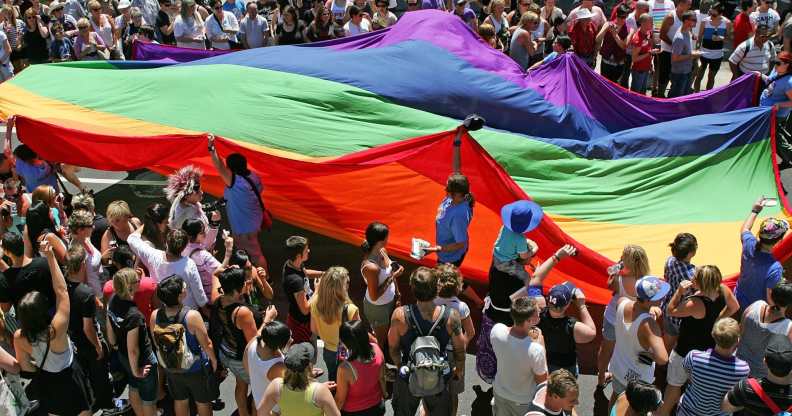Pressure mounts for Pride organisers to ban police from marching: ‘Police pose a risk to LGBT+ people’

The 15th annual LGBT+ Pride march on the streets of Melbourne on February 7, 2010. ( Scott Barbour/Getty Images)
Pride organisers in Melbourne, Australia, have been called to ban uniformed police officers from an annual parade because the force “pose a risk” to LGBT+ attendees.
Midsumma Pride, run by the decades-old arts and culture organisation Midsumma Festival, is facing fierce calls from two top state and local advocacy groups to ban cops from its annual parade on 23 May.
For almost two decades, the authorities have taken part in Midsumma Pride, with a contingent from the Victoria Police and Sheriff’s Office Of Victoria set to march in the emergency services wave this year.
But the Victorian Pride Lobby and the Sydney-based Pride in Protest groups have both sought a response from the board of Midsumma to prevent police from marching.
In their letters, activists spoke of the historically fraught relationship between the LGBT+ community and law enforcement. To the groups, the police are simply out of place to considering Pride’s roots as a defiant anti-police uprising.
Moreover, advocates looked to recent flash points in the long-simmering tension between the queer communities and police forces, such as the 2019 police raid of a beloved queer bookstore in Melbourne.
“Police pose a risk to the safety of many LGBT+ community members, particularly First Nations people, people of colour, poor people, sex workers, people with disability and trans and gender diverse people,” the letter from Pride in Protest stated.
“To expect people who have survived police violence to march with their oppressors denies their right to justice and safety at Melbourne Pride.
“Inviting police to march actively excludes the most vulnerable in the LGBTQIA+ community.”
Such calls were amplified by the Victorian Pride Lobby in its own letter. “Pride march should be a safe space for all LGBT+ Victorians, but sadly, due to a long history police violence, harassment and discrimination, this isn’t the case,” the letter stated.
STATEMENT: Pride Lobby backs call to prevent uniformed police from marching at Pride March.
The Victorian Pride Lobby has signed an open letter calling on Midsumma to prevent police officers and corrections officers from marching at Pride in uniform: https://t.co/N2FBqoxgjz pic.twitter.com/k5GlZx9Lxq
— Victorian Pride Lobby (@VicPrideLobby) May 18, 2021
“Particularly for the most marginalised in our community, who are disproportionately targeted.”
The group claimed that, following a survey of more than 1,500 members of the LGBT+ community, an “overwhelming majority of people” shared this view.
No individual, no matter their background, is being excluded from participating in Pride March. People have the opportunity to join other community floats. Central to Pride March is the celebration of inclusivity of all members of the LGBTIQA+ community and their allies (2/2).— Victorian Pride Lobby (@VicPrideLobby) May 19, 2021
Victorian Pride Lobby co-convenor Nevena Spirovska added in the letter: “The LGBT+ community has a fraught history with the police.
“And that’s why the Victorian Pride Lobby does not support police officers and corrections officers marching at Pride in uniform.
“It is important to note that no individual, no matter their occupation or background, is being excluded from participating in Pride March and that people have the opportunity to join other community floats that are involved.”
It comes after New York City Pride last week took steps to ban police and correctional officers from its annual Pride march until at least 2025.
While from Wisconsin, US, to Toronto, Canada, Pride organisers banning uniformed police officers from taking part in parades is in no way uncommon.
As much as some Pride events, such as London’s, continue to grapple with barring officers, such decisions highlight the increasing pressure law enforcement now faces to address longstanding grievances about diversity.

